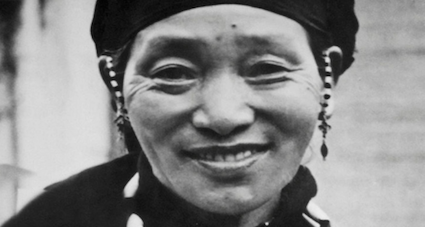Very few know in mainstream India know about Rani Gaidinlu which is a pity. Very few are also aware that Manipur is hosting polls alongside Punjab, UP, Goa, Uttarakhand presently. And that its’ two-phase dates are February 28 and March 5—which again is a pity.
And all this is because North East has long been neglected by India’s academia and intelligentsia and cropped up only when a point is needed to be made against the ruling dispensation of BJP. Such propagandists prefer strife and not success when it concerns North East.
Rani Gaidinliu was a multi-faceted life in the 20th century. Born on January 26, 1915 at Luangkao village, now in Manipur, she was a spiritual and political leader.
Her cousin Haipou Jadonang, a religious leader and freedom fighter, initiated her at a tender age of 13 into Heraka movement—a religious reform movement—for Zealingrong Naga communities. It later acquired a political dimension. It aimed to drive British out of the region.
Jadonang was later caught and executed by the British. The mantle was now upon Gaidinliu. She went into an overdrive to see British out. It all began with Gaidinliu asking Zeliangrong Nagas not to pay taxes. They in turn sustained her campaign against the British who were in hot pursuit to apprehend her. Gaidinliu evaded arrest, moving across villages in present day Assam, Manipur and Nagaland.
British now launched a manhunt against her. Gaidinliu’s forces engaged with the Assam (British) Rifles in armed conflicts in the North Cachar Hills and the Hangrum Village in early months of 1932.
A stream of Assam Rifles battalions were now despatched to arrest her. A monetary reward was also put up. Gaidinliu was finally arrested and imprisoned for life—hold your breath—at the age of 16. From 1933 to 1947, she served time at the Guwahati, Shillong, Aizawal and Tura jails.
Jawaharlal Nehru met her at Shillong jail in 1937 once and was later to term her the “Daughter of the Hills.” He gave her the title “Rani” as she is now revered as Rani Gaidinliu.
Rani Gaidinliu was released from prison after India’s independence in 1947. She continued to work for the upliftment of Naga people. An advocate of the ancestral Naga religious practices, she staunchly resisted the conversion of Nagas to Christianity and advocated the religious Naga practices. She was honoured as a freedom fighter and was awarded a Padma Bhushan by the Government of India in 1982.
Imphal-based historian Professor N Joykumar Singh opined that Rani Gaidiliu was one of the few women political leaders who exhibited an outstanding courage during the British Raj. She orchestrated not only an armed resistance but inspired many to follow her. Such was an impact of her charisma that in 1938, the Nikhil Manipur Maha Sabha, the first political party of Manipur during the British colonial rule adopted a resolution to free Rani Gaidinliu from prison.
She passed away on February 17, 1993 at her native village Luangkao, Manipur. She was bestowed with Tamrapatra in 1972, PadmaBhushan in 1982, Vivekananda Sewa Summan in 1983, and Stree Shakti Puraskar in 1991.
She posthumously was awarded the Bhagwan Birsa Munda Puraskar in 1996. The Government of India also issued a commemorative stamp in her honour in the same year.
Last November, Union home minister amit Shah laid the foundation stone for the “Rani Gaidinliu Tribal Freedom Fighters Musuem” in Manipur’s Tamenglong district. Shah tweeted:
Manipur’s chief minister N. Biren Singh acknowledged the moment thus: “The honour given to Rani Gaidinliu is very well deserved. It is a proud moment particularly for the Northeastern region for it can be viewed as an honour to the entire region.”


